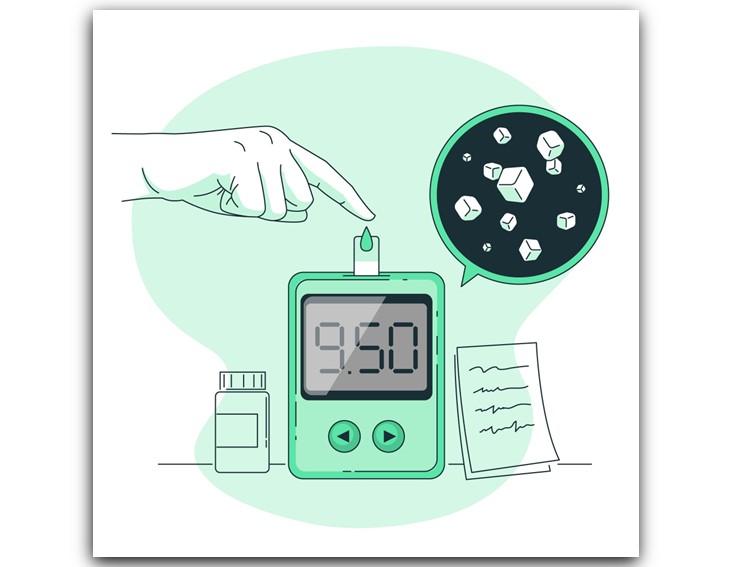Living with diabetes can feel overwhelming at times, especially when you’re trying to understand how it affects different parts of your body. One of the most important organs impacted by diabetes is your kidneys. If you’ve been recently diagnosed with diabetes or have been managing it for a while, it’s crucial to understand the connection between diabetes and kidney health.
So, the big question is: Does diabetes affect the kidneys?
The Short Answer: Yes, It Does
Diabetes is one of the leading causes of chronic kidney disease (CKD) and kidney failure worldwide. If not managed properly, high blood sugar levels over time can damage the kidneys’ filtering system, leading to a condition called diabetic kidney disease
Let’s break this down further.
How Do the Kidneys Work?
Your kidneys are two bean-shaped organs located on either side of your spine. Their primary job is to filter waste and excess fluids from your blood, which are then excreted through urine. The kidneys also help regulate blood pressure, produce hormones like vitamin D, and also help in chemical balance in the body
Each kidney contains about a million tiny filtering units called nephrons, which are responsible for cleaning your blood.
How Diabetes Affects the Kidneys
When your blood sugar levels are consistently high, it can damage the small blood vessels in the kidneys. The damaged blood vessels will start to leak protein from the blood. Increasing protein leak will lead to further damage to the kidney, which will eventually result in kidney failure
Key Ways Diabetes Can Harm Your Kidneys:
- Glomerular Damage: The glomeruli are the tiny filters in your kidneys. High blood sugar causes these filters to become leaky, allowing protein (like albumin) to pass into the urine — an early sign of kidney damage.
- High Blood Pressure: Diabetes often coexists with high blood pressure, which puts extra strain on the kidneys and accelerates kidney damage.
- Oxidative Stress and Inflammation: Chronic high blood sugar levels cause inflammation and oxidative stress in the kidney tissues, further damaging them.
- Nerve Damage: Diabetes-related nerve damage can impair bladder function. If the bladder doesn’t empty completely, it causes back pressure on the kidneys and increases the risk of urine infections.
Signs of Kidney Damage from Diabetes
Kidney damage develops slowly and may go unnoticed in the early stages. That’s why regular check-ups are important. As the condition progresses, you may start noticing the following symptoms:
- Foamy or bubbly urine (sign of protein in urine)
- Swelling in the legs, ankles, or feet (due to fluid retention)
- Fatigue or weakness
- Increased need to urinate, especially at night
- High blood pressure
- Nausea or vomiting
How to Detect Diabetic Kidney Disease Early
Two primary tests can detect early kidney damage:
- Urine Albumin Test (Microalbuminuria Test): Detects protein (albumin) in urine.
- Blood Creatinine Test and eGFR (Estimated Glomerular Filtration Rate): Measures kidney function.
If you’re living with diabetes, your doctor will likely recommend these tests twice a year to monitor kidney health.
Can Kidney Damage from Diabetes Be Prevented or Reversed?
In the early stages, yes, kidney damage can be slowed or even reversed with proper treatment and lifestyle changes. However, once kidney function drops significantly, the damage may become irreversible, possibly requiring dialysis or a kidney transplant.
If you have diabetes, is there any way to protect your kidneys
Yes, the following strategies can help keep your kidneys healthy if you have diabetes:
-
Maintain Target Blood Sugar Levels
- Follow your diabetes care plan strictly.
- Monitor your blood sugar regularly.
- Take medications or insulin as prescribed.
-
Keep Your Blood Pressure in Check
- Ideal target: Below 130/80 mm Hg
- Consider medications like ACE inhibitors or ARBs, which also protect kidney function.
-
Adopt a Kidney-Friendly Diet
- Reduce salt intake.
- Donot consume any soft drinks,Avoid intake of processed foods like noodles,pizza,samosa and other fast foods
- Eat more fresh fruits, vegetables, and whole grains.
-
Stay Hydrated
- If you drink adequate water, your kidneys remain healthy by flushing out toxins.
-
Avoid Over-the-Counter Painkillers
Painkillers like ibuprofen can harm the kidneys if taken frequently.
-
Don’t Smoke
- Smoking leads to accelerated kidney damage by restricting the blood flow to the kidneys
-
Get Regular Check-Ups
- Annual kidney function and urine tests
- Monitor cholesterol and heart health, too
When to See a Nephrologist
If your primary care physician or diabetologist notices any protein in the urine, you will need to see a nephrologist—a doctor who specializes in kidney care. Early treatment from a kidney specialist can slow progression of your kidney disease and help you manage complications more effectively.
Bottom Line
Yes, diabetes does affect the kidneys, but the good news is that with early detection, lifestyle changes, and proper medical care, it is possible to prevent or delay kidney damage. All those with Diabetes should get their urine tests and kidney tests done every 6 months and consult kidney doctor early
Your kidneys are working 24/7 to keep your body clean and balanced — show them some love by taking care of your diabetes today!
Remember!
If you have diabetes, the risk of kidney disease and kidney failure is much higher. You must, therefore, remain proactive and vigilant
If you’re living with diabetes and haven’t had your kidneys checked recently, talk to your doctor today and please get blood tests and urine tests.

Leave a Reply